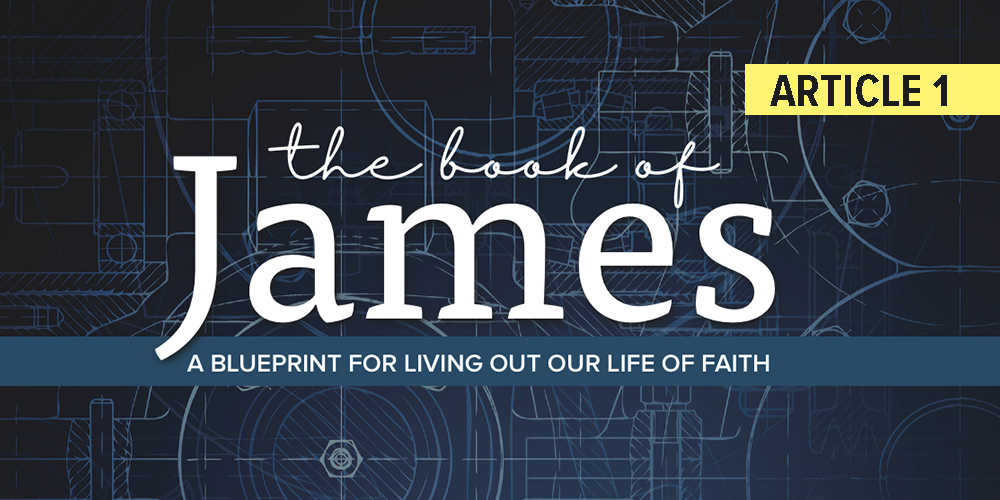 |
What’s a book like James doing in the New Testament anyway? Quickly reading through its 108 verses, we find no direct mention of the Christmas manger, the Good Friday cross, or the Easter garden. Some even think James chips away at the central doctrine of justification by faith and therefore avoid his letter.
Yet as we read through this letter more carefully, we soon discover that it belongs. Other New Testament books outline the great themes of the Christian faith; James writes about living that faith. Other books teach Christian doctrine; James seeks to stimulate Christian life. Other books encourage hearing the gospel of salvation; James urges showing in our daily life that we have heard it and believe it. In short, James gives us a blueprint for Christian living.
Who is James?
We don’t know as much as we would like about James. All we are told are his name and that he was a “servant of God and of the Lord Jesus Christ” (1:1). Perhaps he was a man that his readers would know and didn’t need any more details. Many scholars have adopted this view and identified James as the half-brother of the Lord. This James had not been one of the 12 disciples. It appears he did not believe in Jesus until after the resurrection. Then he became a pillar in the early church, having great influence among Jewish believers.
Our lack of knowledge about James does not affect the words he wrote. When we take our doctor’s prescription to the pharmacy, it matters little what the pharmacist’s name is. The important point is that he fills the prescription just as the doctor ordered. It’s the same with this book. Who James was is not nearly as important as the words the Holy Spirit inspired him to write.
Why did he write?
“The twelve tribes scattered among the nations” (1:1) was the technical term for the Jews who were scattered throughout the Roman world of the first century. James was not writing to all Jews, only to Jewish Christians. Life wasn’t easy for them. They struggled under the pressure of persecution from without and the problem of personal sin from within. So, James wrote against their worldliness, to provide comfort in their sorrows and to give counsel for their lives. His words are painfully practical, urging his readers to match profession with performance and creed with conduct. “High talk and low walk” were no more in place among the Christians of his day than today.
We dare not misunderstand James. He’s not promoting Christian living as a means of earning heaven. That Jesus Christ has done once for all. What James is saying is that those who are filled with and fueled by Christ’s great love will live like Christians. Though James seldom mentions the Savior by name, we soon see his bright light shining on every page and his love moving behind every admonition.
Each generation likes to think that its questions and problems are new. Our study of James will show again that though problems may vary in shape and size, little more than the calendar separates 21st-century Christians from those who first read James’ letter. His blueprint for Christian living is still important for Christians today.
This is the first article in a series on the book of James.
Digging deeper
- What can we learn about James from Matthew 13:55; Galatians 1:19; Acts 15:13-21; and Acts 21:18?
- Matthew 13:55: Isn’t this the carpenter’s son? Isn’t his mother’s name Mary, and aren’t his brothers James, Joseph, Simon and Judas?
- Galatians 1:19: I saw none of the other apostles—only James, the Lord’s brother.
- Acts 15:13-21: When they finished, James spoke up. “Brothers,” he said, “listen to me. Simon has described to us how God first intervened to choose a people for his name from the Gentiles. The words of the prophets are in agreement with this, as it is written: “ ‘After this I will return and rebuild David’s fallen tent. Its ruins I will rebuild, and I will restore it, that the rest of mankind may seek the Lord, even all the Gentiles who bear my name,’ says the Lord, who does these things—things known from long ago.” “It is my judgment, therefore, that we should not make it difficult for the Gentiles who are turning to God. Instead we should write to them, telling them to abstain from food polluted by idols, from sexual immorality, from the meat of strangled animals and from blood. For the law of Moses has been preached in every city from the earliest times and is read in the synagogues on every Sabbath.”
- Acts 21:18: The next day Paul and the rest of us went to see James, and all the elders were present.
- Some answers: James is related to the Lord Jesus. He is called a brother but “brother” may simply mean a member of his family. We commonly believe that he was indeed the Lord’s brother. The Acts passages identify James as part of the congregation in Jerusalem after Pentecost. He is an active and respected elder in that congregation.
- What does Ephesians 2:8-10 tell us about the relationship between faith and works?
- Ephesians 2:8-10: For it is by grace you have been saved, through faith—and this is not from yourselves, it is the gift of God—not by works, so that no one can boast. For we are God’s handiwork, created in Christ Jesus to do good works, which God prepared in advance for us to do.
- Some answers: Our works do not earn salvation. That is a gift of God’s grace through faith in Jesus. But believers are created to do good works that demonstrate their faith in the gift of salvation.
Author: Richard Lauersdorf
Volume 107, Number 07
Issue: July 2020
- Psalm 103: When you count your blessings
- Psalm 91: When God lifts you up on his lap
- Psalm 4: When you draw nearer to the end
- Psalm 42: When you ask, “Where is God when I’m hurting?”
- Psalm 32: When you need forgiveness
- Psalm 130: When rocks fall
- Bible study: Freedom in service
- What does this mean for me? Article 6
- Bible study: Spiritual gifts
- What does this mean for me? Article 5
- What does this mean for me? Article 4
- Bible study: Rejoice in your status!
- Bible study: Baptismal blessings
- What does this mean for me? Article 3
- What does this mean for me? Article 2
- Bible study: Gifts of tongues and miraculous healing
- What does this mean for me? Article 1
- Bible study: Jesus is everyone’s Savior
- Bible study: Love one another
- Bible study: Above all things!
- Bible study: The comfort of God’s providence
- The book of James: Waiting for Christ’s return
- Bible study: Precious grace
- The book of James: Active in using prayer
- Bible study: Rewards of grace
- The book of James: Active in showing love
- The book of James: Correctly evaluating riches
- Bible study: What’s going to happen on the Last Day?
- The book of James: Avoiding loveless judging
- Bible study: Interpretation practice
- The book of James: Taming the tongue
- Bible study: The Bible’s attributes
- Bible study: The importance of the family altar
- Bible study: God’s attitude is grace
- Bible study: The Bible’s account of Easter morning
- Bible study: Different types of sin
- Bible study: God’s inspiration
- Bible study: Giving God glory
- Bible study: Judge for yourself
- The book of James: Using the Word of Truth
- Bible study: The need for the Bible and worship
- Bible study: Citizens of two kingdoms
- The book of James: Active in good works
- The book of James: When battling temptation
- Bible study: God cares
- Bible study: God made the world
- The book of James: When facing trials
- Bible study: A loving God saved people from hell
- The book of James: A blueprint for living out our life of faith
- A Bible story just for me: Guilt
- Bible study: God provides victory over death!
- A Bible story just for me: Anxiety
- Bible study: God forgives and refuses to remember our sins
- A Bible story just for me: Grief
- Bible study: God helps those who cannot help themselves
- A Bible story just for me: Depression
- Bible study: God has not grown soft on sin
- Bible study: Only one path leads to God’s presence
- A Bible story just for me: Trauma
- A Bible story just for me
- Bible study: God wants me in heaven
- Bible study: The incarnation of our Lord






